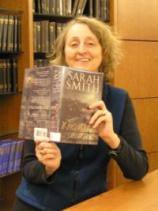Excerpt
Excerpt
A Citizen of the Country

How do you tell your son you have committed murder?
Murder didn't define Alexander Reisden anymore. He had got over being guilty of it (got over, he thought, as one might get over a heavy cold); he was well, more or less. But murder affects families. It is a disease, claiming victim after victim. And Toby was so little, and Toby's fingers grasped his father's thumb so trustingly; and Reisden adored his baby boy; and someday, some terrible day, Toby would know.
Toby might forgive him, might perfectly understand. But how would it affect him?
Reisden had committed his murder at eight years old. He had had excuses; it had been necessary; but no one knows that when he is eight years old. Toby would learn, but Reisden desperately wanted to save him from it until he was much older than eight.
This was morbid. Toby was only seven and a half months old. You could have held him up and said into his face "Your papa killed his grandfather," and he would only have giggled and tried to grab your nose.
Reisden wanted, really, never to tell Toby anything, never to let anyone tell Toby; he wanted Toby never to hear about mad William Knight or Richard Knight or the horrors that can happen to children. He wanted to keep his boy safe.
There is a story like this, about loving parents and a curse and all the spindles in a kingdom, but Reisden didn't know it. He only knew a father is supposed to protect his child.
So should a mother, Reisden reflected, and Perdita wasn't protecting Toby.
The first thing she'd said after Toby was born was how glad Gilbert would be. She wrote to Gilbert every week. She sent news of Toby, pictures of Toby, a curl of Toby's baby hair bound with thread. Don't, Reisden thought silently, my G-d, don't curse Toby with Gilbert Knight.
Gilbert had the discretion to keep away, but Perdita insisted on writing.
Reisden snapped at her about her eyesight, which was not fair. Perdita insisted on going out in the Paris streets with nothing but Toby and her white cane. "Let him go with his nurse."
"But I like getting out," she said mildly, "and I must learn the streets."
"Not with him."
"Don't you believe I would be careful, Alexander?"
He did not believe it. She was not careful. She could see only colors and shadows; she could push Toby's pram out into the street, not seeing the bus or the horse that would kill them both. He could feel the impact in his own flesh. He was terrified for his son; sometime, somehow, something terrible would happen to his son.
She was not careful about Gilbert.
She is risky, he thought once of the intelligent, stubborn, beautiful girl he had loved before she had become his son's mother. It saddened him. He loved her.
This was morbidity too; this, he thought, was perhaps murder itself, the slow death that murder leaves in families.
"Are you afraid for your children?" he asked other fathers. Yes, they said, of course they were.
It was as close as Reisden could come to talking about what was wrong with his family.
Financial security, at least, one can give.
General Lucien Petiot looked like Father Christmas in a sky blue uniform; he had a cloud white beard and twinkling blue eyes and was in charge of procurement (Medical Section) for the French army. General Petiot bought miles of bandages, barrels of mercurochrome, trainloads of cough pastilles--and tests for the French army. Intelligence tests, tests of mental competence; every man in France served three years in uniform, and the army needed to identify potential officers and potential problems.
Reisden's company, Jouvet Medical Analyses, did competency testing for the courts and specialized neurological testing for hospitals all over Europe. Jouvet could administer Berthet's intelligence test to large groups. In September 1910, just after Toby was born, Reisden first approached Petiot. "We want to supply medical tests and neurological work to the army."
"You're an ambitious man."
"I have a son."
For six months Reisden and Petiot ate dinners together, spent afternoons talking about the state of medicine in France, traded opinions, deplored the government, and tested each other. Petiot toured Jouvet's half-completed building, under reconstruction after the Paris floods. "You want the money," Petiot said, admiring the expensive new lab. "I want the job," Reisden said. "Let me talk to your staff," Petiot said. Through the winter, Petiot became as familiar at Jouvet as the concierge's cat, poking his nose into staff meetings, sniffing at a technician's bench, hovering outside the locked door of the famous Jouvet medical archives.
On a cold day at the beginning of April 1911, Petiot came to Reisden's office at Jouvet and dropped his bomb. "There's only one trouble with Jouvet's pr oposal, Reisden: it's you. Your background."
They were sitting on packed boxes of books in the middle of chaos, the wallpaper half up, the paneling still tacky with varnish, the air damp with the smell of wet plaster.
"This is a bad time politically," Petiot said. "Germany threatens us, with Spain and Austria-Hungary behind her; the French army is small and underprepared; and at this very moment, the most intelligent of von Loewenstein's Orphans decides he wants to throw in his lot with us. One wonders what you mean by it. Isn't that what Leo von Loewenstein used to say?"
"The Orphans are a myth."
"A myth, oh dear, yes," said Petiot. "But one of the mythical Orphans owns a French company that does medical analysis, of a kind that would give it access to embarrassing information about army men, government officials." Petiot frowned. "Certain people are very distressed."
"I appreciate your difficulty," Reisden said.
"I knew you would."
Petiot had been carrying a thin leather portfolio. He opened it on one of the cartons of books. "Alexander von Reisden," Petiot read aloud, "born 1879, South Africa, only son of Baron Franz von Reisden, yes, yes, adopted 1889 by Count Leo von Loewenstein, a diplomat." Petiot tapped the word diplomat and let his neat white eyebrows rise a quarter-inch. "Eighteen ninety-eight, you took as a mistress the sister of a radical Russian; Loewenstein wanted to know about the radicals. You married her 1900; she died that year, very sad. October 1906 you moved to Paris, bought Jouvet early 1907. January 1910, married Perdita Halley, heiress of the American millionaire Gilbert Knight."
"Tasy didn't know what Mikhail was doing and Perdita isn't Gilbert's heiress."
"Tell me about Gilbert Knight," Petiot said.
"Better than that. I'll show you."
Reisden pressed a carved leaf on one of the bookcases and a section of paneling clicked open. Behind it a newly painted staircase led up to
their apartment. The staircase was hung with photographs of Toby and Perdita and their friends: Roy Daugherty, Suzanne Mallais, Reisden's almost-nephew Tiggy and his dog. Reisden found the smallest and most blurred picture in the darkest corner between the windows. He handed it down the staircase to Petiot. "Gilbert Knight," he said.
Petiot looked at the picture and up at Reisden. "Remarkable resemblance. Really extraordinary."
"His lawyers were afraid I was an unofficial relative," Reisden said. "Perhaps his nephew Richard, who disappeared. I'm not." It had been unnecessary to say that, he thought.
"It wouldn't have hurt for you to be American. A better connection than Loewenstein."
"Who, precisely, is objecting to me?"
Petiot pulled at his beard. Reisden raised his eyebrows inquiringly.
"Maurice Cyron," Petiot said.
"Cyron?" Reisden put Gilbert's picture down on a carton of books.
"What does Cyron have against you?"
"I did something once he didn't like."
"Could you undo it?"
"I wouldn't want to." He thought of Toby, of protecting Toby. "What does he say about me?"
Petiot shrugged. "I mentioned your name in his hearing, at a club. Explosion! He said you had ruined his stepson, you were a neurotic yourself and encouraged Andre's insanity; then he said you were a spy and so on and so forth."
Reisden stood up. "This is Cyron trying to control Andre. Andre asked me to be in one of his plays. He was still a cavalry officer then; you can't imagine how incompetent Andre was in the cavalry, he'd actually lost his horse once. It was the mediocrity of desperation. He couldn't bear not doing professional theatre. He'd found the building he could afford. He'd found Jules, who could play the roles he was writing.--Andre couldn't explain it to Cyron; he couldn't even face him; he couldn't talk about the kind of theatre he wanted to do. He asked me to go with him, to talk with Cyron, to explain to him why Andre, Count of Montfort, couldn't stick the life Cyron had chosen for him."
"Why you?"
"I wish I hadn't, of course, now." Gilbert's picture was still lying on the book carton. Reisden turned it upside down. "No, I don't. I knew a madman once who beat a child almost to death. I know madmen; it comes with Jouvet. I like to bring them back safe. You asked me why I want this job. Cyron was always a bully. He said Andre was insane to do the kind of theatre he does. Andre is odd and sad, but he isn't mad and he had to go into the theatre. Cyron was wrong."
"Have you seen Andre in the past year?" Petiot asked.
Reisden shook his head. "I haven't seen anyone but my family and the builders."
"You know that he's married?"
"Andre is?"
"To a little girl from the country." Petiot shook his head. "Maurice is very worried about them."
Excerpted from A Citizen of the Country © Copyright 2012 by Sarah Smith. Reprinted with permission by Ballantine. All rights reserved.
A Citizen of the Country
- paperback: 448 pages
- Publisher: Ballantine Books
- ISBN-10: 0345433033
- ISBN-13: 9780345433039


